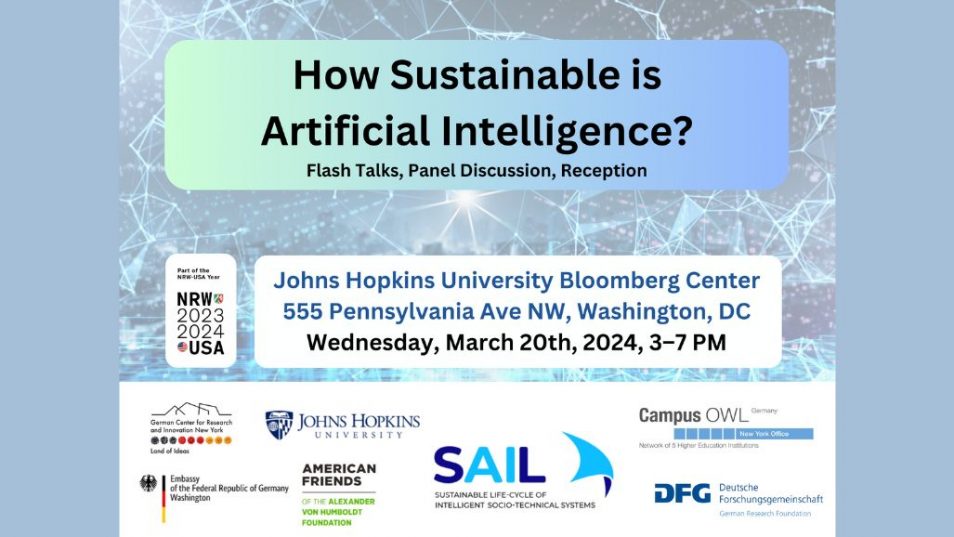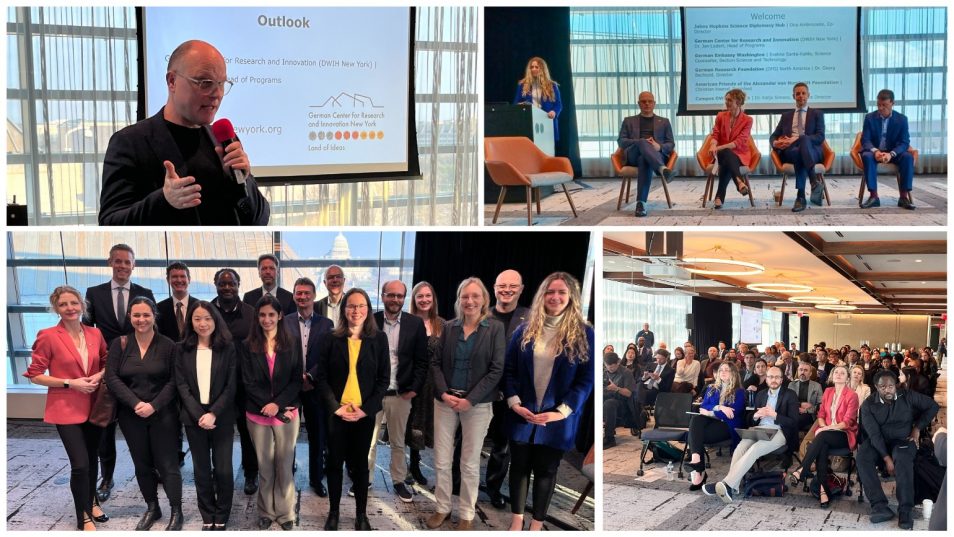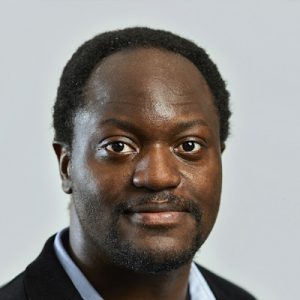How Sustainable is Artificial Intelligence?
 © Campus OWL
© Campus OWL
The Campus OWL New York Office together with the Johns Hopkins Science Diplomacy Hub, the German Embassy Washington DC, the German Center for Research and Innovation New York (DWIH), the American Friends of the Alexander von Humboldt Foundation, and the German Research Foundation (DFG) North America, hosted an event on sustainable AI practices on March 20th, 2024, in Washington, D.C.

The profound impact of artificial intelligence on our society cannot be overstated. From communication and healthcare to transportation and entertainment, a significant portion of industries now rely on intelligent approaches to streamline processes, enhance efficiency, and discover new market opportunities. However, the rapid advancement of AI technology also comes with challenges and concerns.
As AI becomes increasingly integrated into our daily lives and critical systems, there is a pressing need for sustainable AI practices. These include the responsible and ethical development, deployment, and usage of AI that considers the long-term well-being of both society and the environment.
Additionally, sustainable AI calls for the preservation of privacy and data security, as well as addressing the potential job displacement caused by automation.
With this event, the aim was to initiate long-term international exchange between research and industry to foster sustainable AI practices.
Our goal was to ensure that we can harness the benefits of this transformative technology while safeguarding against its unintended negative consequences, thus creating a better future for all.
Agenda
3:00 – 3:10pm – Arrival
3:10 – 3:25pm – Welcome Rounds and Introduction into Sustainable AI
3:30 – 4:30pm – Flash Talks on: Expanding the Accessibility of Large Language Models, Learning from Small and Messy Data, Applying Trustworthy Models
4:30 – 5:00pm – Networking Coffee Break
5:00 – 6:00pm – Panel Discussion: “Large Language Models: Risks and Opportunities for Science and Society”
6:00 – 7:00pm – Networking Reception
Speakers

Hanjie Chen is an incoming Assistant Professor in the Department of Computer Science at Rice University. She currently works as a Postdoctoral Fellow in the Center for Language and Speech Processing at Johns Hopkins University. She obtained her Ph.D. in Computer Science in May 2023 at the University of Virginia. Hanjie is broadly interested in Trustworthy AI, Natural Language Processing, and Interpretable Machine Learning. Specifically, her research focuses on the interpretability, robustness, and fairness of neural language models. Through innovative solutions, she seeks to bridge the trustworthy gap between models and humans, enabling understanding and interaction between them. In the long term, she is dedicated to developing explainable AI techniques that are easily accessible to system developers and end users for building trustworthy and reliable intelligent systems.Dr. Hanjie Chen, Postdoctoral Fellow, Center for Language and Speech Processing, Johns Hopkins University (as of 07/2024, Assistant Professor, Department of Computer Sciences, Rice University)

Anjalie Field is an Assistant Professor in the Department of Computer Science and the Center for Language and Speech Processing (CLSP) at Johns Hopkins University. Her research focuses on the ethics and social science aspects of natural language processing, which includes developing NLP models to address societal issues like discrimination and propaganda, as well as critically assessing AI pipelines. Prior to joining JHU, she was a postdoctoral researcher in the Stanford NLP Group and Stanford Data Science Institute working with Dan Jurafsky and Jennifer Eberhardt. She completed her PhD at the Language Technologies Institute at Carnegie Mellon University, advised by Yulia Tsvetkov.Dr. Anjalie Field, Assistant Professor, Department of Computer Science, Johns Hopkins Whiting School of Engineering

Kenton Murray is a Research Scientist at Johns Hopkins University’s Human Language Technology Center of Excellence (HLTCOE). He also has appointments in the Center for Language and Speech Processing (CLSP) and the Computer Science Department. His work focuses on scaling AI technologies to work on languages beyond English – particularly morphologically rich languages and under-represented/low-resource languages. He holds a PhD from the University of Notre Dame, a MS from Carnegie Mellon University, and a BSE from Princeton University. He directs the Maieutic Lab on campus, is the author of over 50 publications, and has helped build Large Language Models (LLMs) and Datasets that have been downloaded over 50,000 times.Dr. Kenton Murray, Research Scientist, Human Language Technologies Center of Excellence, Johns Hopkins University

Axel-Cyrille Ngonga Ngomo is a full Professor at the Department of Computer Science at Paderborn University, where he heads the Data Science research group DICE and the Joint Artificial Intelligence Institute Paderborn-Bielefeld (JAII). He completed his studies in computer science at the University of Leipzig and received his doctorate in 2009 on knowledge-poor methods for extracting taxonomies from large text corpora. He was awarded the Venia Legendi in 2018 for his habilitation with a focus on machine learning and knowledge graphs. In his research, Axel Ngonga focuses on foundational research on data-driven methods to improve the lifecycle of knowledge graphs. These include techniques for the extraction of knowledge graphs, the verification of their veracity, their integration and fusion, their use in machine learning, and their exploitation in user-facing applications such as question answering systems and chat bots. Axel Ngonga has served in various functions at multiple international conferences, including ISWC, ESWC, WWW, AAAI, ECAI, and IJCAI. He has received over 25 prestigious international research awards for his outstanding work, including the Next Einstein Fellowship, Lamarr Fellowship and multiple best research paper awards. In addition to the SAIL Research Network, Axel Ngonga oversees several other notable research projects such as two MSCA Doctoral Networks (KnowGraphs and LEMUR), and the Research and Innovation Action ENEXA. He is also a PI in the Collaborative Research Center TRR318 “Constructing Explainability” - funded by the German Research Foundation (DFG) - and NEBULA - funded by the German Ministry of Education and Research (BMBF).Dr. Axel-Cyrille Ngonga Ngomo, Professor, Department of Computer Science, Paderborn University

Ole Pütz is the Scientific Manager of the SAIL project. He received a PhD in Sociology from Bielefeld University, Germany, and has since been working in different interdisciplinary projects with computer scientists. Before returning to Bielefeld University as a scientific manager, he has worked as a postdoc for the "Science of Intelligence" Cluster of Excellence at TU Berlin, Germany. His current research interests are the investigation of online and offline conflicts, as well as exploring the limitations of large language models and the systems they are embedded in.Dr. Ole Pütz, Scientific Manager of the SAIL network, Bielefeld University

Luana Ruiz is an Assistant Professor with the Department of Applied Mathematics and Statistics at Johns Hopkins University. She received the Ph.D. degree in electrical engineering from the University of Pennsylvania in 2022, and the M.Eng. and B.Eng. double degree in electrical engineering from the École Supérieure d'Electricité, France, and the University of São Paulo, Brazil, in 2017. Luana's work focuses on large-scale graph information processing and graph neural network architectures. She was awarded an Eiffel Excellence scholarship from the French Ministry for Europe and Foreign Affairs between 2013 and 2015; nominated an iREDEFINE fellow in 2019, a MIT EECS Rising Star in 2021, a Simons Research Fellow in 2022, and a METEOR fellow in 2023; and received best student paper awards at the 27th and 29th European Signal Processing Conferences.Dr. Luana Ruiz, Assistant Professor, Department of Applied Mathematics and Statistics, Johns Hopkins Whiting School of Engineering

Wolfram Schenck is a Professor of engineering informatics at Hochschule Bielefeld – University of Applied Sciences and Arts (HSBI), Germany, where he founded the Center for Applied Data Science Gütersloh (CfADS) together with two colleagues in 2017. He received his diploma in psychology with a minor in computer science from Heidelberg University in 2001. He then joined the Cognitive Robotics Group at the Max Planck Institute for Psychological Research in Munich. Since then, he has been working on adaptive systems that learn from their own experience. In 2003, he moved to Bielefeld University to continue his work in the Computer Engineering Group of the Faculty of Technology, where he received his doctoral degree in 2008 for his work on internal models, motor learning, and visual prediction. From 2013 to 2015, he worked at the Simulation Laboratory Neuroscience at Forschungszentrum Jülich in the area of high-performance computing for computational neuroscience. His current research interests are active learning, clustering, and the advancement of deep learning algorithms for various application areas.Dr. Wolfram Schenck, Professor, Faculty of Engineering and Mathematics, Hochschule Bielefeld – University of Applied Sciences and Arts (HSBI)
Event Information
March 20, 2024, 3:00 PM to 7:00 PM
Johns Hopkins University Bloomberg Center, Washington DC
Organizer(s): Campus OWL New York Office, Johns Hopkins Science Diplomacy Hub, German Embassy Washington DC, German Center for Research and Innovation (DWIH) New York, American Friends of the Alexander von Humboldt Foundation, and German Research Foundation (DFG) North America
